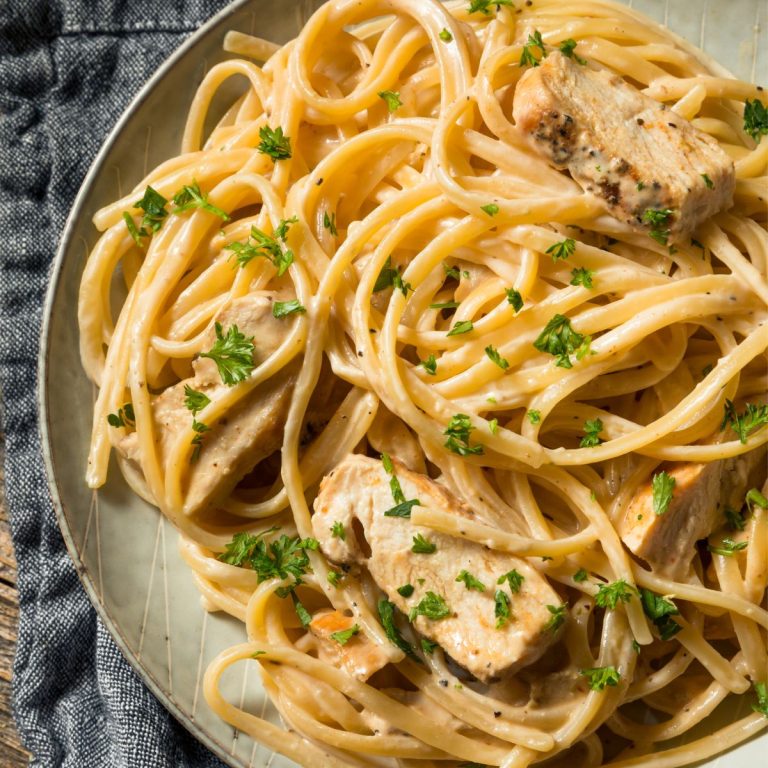how to fix tough meat in slow cooker
Meat coming out tough from the slow cooker can be frustrating. Cooking low and slow is often a foolproof method, but sometimes even that doesn’t guarantee tenderness. In this post, we’ll delve into ways to ensure your meat falls apart with just a fork, transforming those chewy disappointments into succulent feasts.
Keep reading for the secret to perfectly tender slow-cooked meat every time!
Key Takeaways
- Marinate meat with acidic things like vinegar or lemon juice to make it softer.
- Use the right meat cuts for slow cooking, like chuck roast or pork shoulder, that have fat and connective tissue.
- Keep enough liquid in the slow cooker to help cook the meat evenly and make it tender.
- Cook the meat on a low heat setting for a long time to break down tough parts in the meat.
- Don’t open the lid of the slow cooker too often; it lets out heat and steam that are needed for cooking.
Understanding the Problem of Tough Meat in Slow Cooker
Tough meat in a slow cooker can be caused by various factors such as overcooking, using the wrong cuts, or not adding enough liquid. It’s important to understand the reasons behind tough meat and different types of overcooked meat to effectively address the issue.
Reasons behind tough meat
Meat can become tough in the slow cooker if it’s not cooked right. One main reason for this is using the wrong kind of meat. Tough cuts, like chuck roast or brisket, have lots of connective tissue and muscle fibers that need time to break down and get tender.
Another cause for meat turning tough is cooking at a high temperature. Heat needs to be low and even to make these fibers soft without drying out the meat. Also, if there isn’t enough liquid, the meat won’t cook properly.
The moisture helps by breaking down those hard parts in the meat over hours in the slow cooker.
Sometimes people cook it too fast or open the lid too much to check on their dish. This lets heat escape and changes how evenly your meal cooks which can lead to tougher results. It’s important not only what you do while cooking but also before you start—the way you prep your ingredients matters a lot! Marinating meat or letting it come up to room temperature before cooking can help prevent toughness as well.
Types of overcooked meat
When meat is overcooked in a slow cooker, it can become tough and dry. This is especially common with lean cuts like chicken breast, pork loin, or certain beef cuts that have less fat marbling.
Overcooking these types of meat for an extended period can result in them becoming unpalatable and difficult to chew.
On the other hand, fattier cuts of meat such as pork shoulder or beef chuck are more forgiving when cooked for longer periods in a slow cooker. These cuts contain connective tissue and intramuscular fat which break down during prolonged cooking, resulting in tender and succulent meat.
Tips for Tenderizing Tough Meat
Marinating tough meat with acidic ingredients can help break down the tough fibers, while choosing the right cuts of meat can also make a difference in its tenderness. These tips will be essential in making your tough meat tender and delicious in the slow cooker.
Marinating with acidic ingredients
To tenderize tough meat in a slow cooker, consider marinating it with acidic ingredients. Acidic components like vinegar, citrus juice, or yogurt help break down the muscle fibers in the meat, making it more tender and flavorful.
Simply let the meat sit in the acidic marinade for several hours before placing it in the slow cooker to work its magic. This technique not only helps in softening tough cuts of meat but also infuses them with delicious tangy flavors, adding depth to your slow-cooked dishes.
By marinating tough meat with acidic ingredients, you can effectively salvage overcooked or dry protein providing an easy solution for fixing tough and dry meat while enhancing its taste and texture within your slow cooker recipes.
Choosing the right cuts
To ensure tender and succulent meat from your slow cooker, selecting the right cuts is crucial. Opt for well-marbled meats like chuck roast, pork shoulder, or lamb shoulder, which have enough fat to keep them moist during long cooking times.
These cuts contain connective tissues that break down and tenderize beautifully when cooked low and slow in a slow cooker. Additionally, consider using tougher cuts of meat with bones as they add flavor and richness to the dish.
By choosing these suitable cuts of meat, you can significantly improve the tenderness and juiciness of your slow-cooked dishes without much effort or time investment.
Methods for Fixing Tough Meat in Slow Cooker
Adding enough liquid to the slow cooker and utilizing a marinade can help tenderize tough meat. Cooking low and slow, using wine or broth, and avoiding opening the lid instantly are also effective methods for fixing tough meat in a slow cooker.
Adding enough liquid
To ensure your tough meat in the slow cooker becomes tender, it is crucial to add enough liquid. The liquid creates steam, which helps keep the meat moist and juicy during the cooking process.
Additionally, a sufficient amount of liquid allows for better heat distribution and ensures that the meat cooks evenly. Whether you’re using broth, water, or a combination of both, make sure there’s enough to cover at least one-third to half of the meat in the slow cooker.
Using ample liquid can be especially beneficial when dealing with tougher cuts of meat as it provides necessary moisture for breaking down connective tissues and collagen over long cooking periods.
Utilizing a marinade
Marinades are a great way to tenderize tough meat. Simply marinate the meat in an acidic mixture, such as vinegar, citrus juice, or yogurt, for several hours before slow cooking. The acid helps break down the tough muscle fibers in the meat, resulting in a more tender and flavorful dish.
Additionally, you can infuse additional flavors by including herbs, spices, and aromatics in your marinade to enhance the overall taste of the dish.
By utilizing a marinade with acidic ingredients and complementary flavors like garlic or herbs before slow cooking, you can effectively tenderize even the toughest cuts of meat in your slow cooker.
Cooking low and slow
To fix tough meat in a slow cooker, cooking low and slow is essential. This method helps to break down the connective tissues in the meat, resulting in tender and flavorful results.
By cooking at a low temperature for an extended period, the collagen in tougher cuts of meat gradually converts into gelatin, creating a more tender texture. Additionally, this technique allows the flavors from any added liquids or seasonings to permeate the meat thoroughly, further enhancing its taste.
Using this approach can be particularly effective when dealing with overcooked or dry meat since it gives enough time for moisture to redistribute within the protein fibers. Moreover, cooking low and slow also minimizes the risk of making tough cuts even harder by avoiding high temperatures that can cause proteins to seize up and become chewy.
Using wine or broth
To fix tough meat in the slow cooker, consider using wine or broth. These liquids not only provide moisture but also impart flavor to the meat. Wine, whether red or white, adds depth to the dish while broth enhances the savory profile.
The acidity in wine can help break down tough fibers in the meat, making it more tender and juicy when cooked slowly in the slow cooker. Similarly, broth not only keeps the meat moist but also infuses it with rich taste, turning tough cuts into succulent delicacies.
By incorporating these ingredients into your slow-cooked dishes, you can effectively revive overcooked and tough meat, ensuring a flavorful and tender result that will surely satisfy your palate.
Avoiding opening the lid instantly
When using a slow cooker to fix tough meat, it’s crucial to avoid the temptation of opening the lid instantly. Opening the lid releases steam and heat, disrupting the cooking process and resulting in longer cooking times.
This can lead to tougher meat due to prolonged exposure to dry heat. Instead, trust the slow cooker’s method of retaining moisture and heat for tenderizing tough cuts of meat without interruption.
For best results in fixing tough meat in a slow cooker, refrain from lifting the lid until towards the end of the recommended cooking time. This helps maintain an ideal environment for breaking down fibers and tenderizing the meat effectively within the slow cooker.
Conclusion
In conclusion, tough meat in a slow cooker can be fixed with some simple techniques. Marinating with acidic ingredients and choosing the right cuts of meat are effective ways to tenderize tough meat.
Additionally, adding enough liquid, cooking low and slow, and using wine or broth can help revive overcooked protein. Remember to avoid opening the lid instantly to prevent dryness when fixing tough meat in the slow cooker.
FAQs
1. Why did my meat get tough in the slow cooker?
Your meat might have gotten tough in the slow cooker if it cooked too fast, was not enough liquid or the cut of meat wasn’t right for slow cooking.
2. How can I make my tough meat tender in the slow cooker?
To make tough meat tender, try using low heat for a longer time and add more liquid like broth or water to help soften it.
3. Can you fix dry and overcooked beef that became tough?
Yes, you can try reviving overcooked beef by simmering it with a sauce or broth which can bring some moisture back into the meat.
4. What are some ways to prevent my stew meat from getting hard?
Prevent stew meat from getting hard by making sure there’s enough liquid while cooking and choosing cuts of meat suited for long, slow cooking times.
5. If I’ve got a hard roast beef, how do I salvage it?
If your roast beef is already cooked but turned out hard, slice it thin and warm up those slices in a pot with gravy or broth to soften them up.
6. Are there special things I should do before putting my beef in the slow cooker to keep it tender?
Yes! Before putting beef in your slow cooker you could marinate your cut overnight or use a tool called ‘meat tenderizer’ on tougher cuts; both methods help break down toughness before starting your slow cook.






